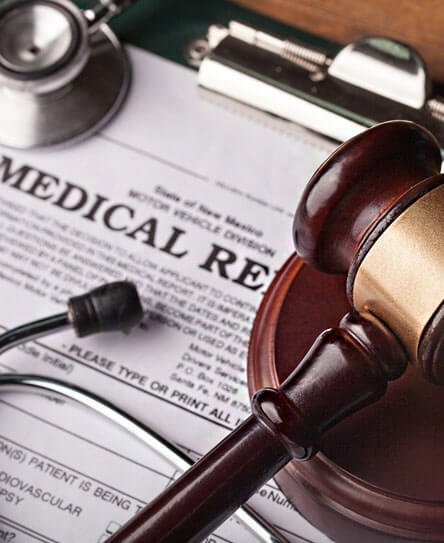904-309-6500Call Us today for Help
Gainesville, FL Medical Malpractice Lawyer
Gainesville Medical Malpractice Attorney
Any personal injury can be difficult to recover from, especially if it was caused by a negligent medical provider. You can take legal action against negligent doctors, nurses, or hospitals by filing a medical malpractice claim. A Gainesville, FL, medical malpractice lawyer can help you file a claim to restore your life by providing compensation for future medical costs, lost wages due to being out of work, and pain and suffering.

Choose a Qualified Medical Malpractice Law Firm
Spohrer Dodd Trial Attorneys have an extensive background working with clients who are victims of medical malpractice. We know how difficult it can be to heal from injuries while meeting the specific deadlines and regulations that come with malpractice cases. Our strategies have led to us recovering over $1 billion for our clients.
Our legal skills can help you deal with reluctant insurance companies that don’t want to pay for your claim. We even have an in-house physician who helps us review cases and offers advice on medical malpractice cases. Connections like these can assist your claim and bring you closer to a successful outcome. Let Spohrer Dodd Trial Attorneys support you during this challenging time.
What Is Medical Malpractice?
When an individual undergoes a medical procedure in Gainesville, FL, they trust that it should be done as effectively as possible. This does not mean a perfect procedure, but it does require the surgeon, doctor, or other practitioner to uphold a certain benchmark of professionalism. This benchmark is often called a standard of care.
If the practitioner does not meet this standard of care, which directly causes injury or harm to the patient, it is legally considered medical malpractice. Once this event happens, the patient or their loved ones must file a claim within two years of the medical event that caused the injuries or within two years after these injuries were discovered.
Why Do I Need an Attorney?
If you are experiencing injuries of this nature, it can be important to contact an attorney who works with medical malpractice cases. While it is not legally required to work with an attorney to file a claim in North Florida, it can save you valuable time. Due to Florida’s short statute of limitations, seeking legal counsel might impact the validity of your case.
A medical malpractice attorney can help you gather the right evidence for your case so that you can make an effective argument against a hospital, an individual practitioner, or an insurance company. Complicated cases like these often benefit from having a skilled legal team on your side.
What Actions Qualify as Malpractice?
In medical malpractice cases, the intent behind an action (or lack of action) can be just as important as the action itself. However, there are some common types of medical mistakes that often qualify as malpractice, including:
- Misdiagnoses: If an illness or condition is diagnosed incorrectly, then the treatment or procedure used to address it might not work and could potentially harm the patient. This is especially prevalent with things like heart attacks. This also applies to a medical provider delaying a cancer screening that could have led to less invasive procedures if the cancer had been found earlier.
- Surgical Errors: There are a surprising number of careless mistakes made in an operating room. Surgeons have operated on an incorrect body part, on the wrong side of the body, and sometimes on the wrong patient entirely. Other preventable errors include puncturing nearby organs and leaving surgical tools inside the patient’s body.
- Improper Dosing of Anesthesia: Anesthesia can provide tremendous relief during painful operations, but it is extremely dangerous if used incorrectly. If a patient is administered too much anesthesia or is not properly monitored for side effects caused by anesthesia, it can lead to serious complications down the line.
- Poor Hospital Treatment: Sometimes, the worst injuries are not caused by medical procedures themselves. A patient can suffer from things like bed sores or injuries from falling while not being supervised post-surgery. If a hospital room is not properly cleaned, the patient could also develop an infection.
- Medication Errors: Doctors can sometimes prescribe the wrong drug or the wrong dosage to a patient without considering their demographics and health history. This can be dangerous if a patient is allergic to a drug or it conflicts with a drug they are already taking. Pharmacists might administer the wrong dosage of a drug or neglect to inform the patient about possible adverse effects that might occur while taking the drug.
- No Informed Consent: In order for a healthcare provider to perform any action on a patient (excluding emergencies), they must first acquire their consent. In order for a patient to provide informed consent, they must know all the relevant benefits and risks that could come with the proposed medical procedure. If a patient gave their consent without understanding all the potential risks, then it might be considered invalid.
The Medical Malpractice Case Timeline
Medical malpractice cases vary significantly in the amount of time they take, but most cases generally follow these steps:
- Consult an Attorney: One of the most important steps in your case is consulting with a lawyer who works with medical malpractice cases. They can tell you whether or not your case is legally valid and outline the steps you need to take to maximize your chances of compensation.
- Conduct a Review: In North Florida, it is legally required to conduct an investigation before filing a claim. In this process, you and your attorney must determine whether your injuries were directly caused by negligence. Documentation like doctor’s notes, medical bills, and photos of your injuries can help in the process. This process usually includes a sworn affidavit from a medical professional in the same field as the one that you’re filing a claim against.
- Submit a Complaint: Once the investigation is completed, your attorney can help you draft a formal complaint to the defendant specifying their harmful actions and the damages you are seeking.
- Discovery: This section is similar to other types of legal action. In the discovery phase, the legal teams of both sides gather evidence supporting their claims. They also collect statements from witnesses.
- Potential Settlement: Many cases settle out of court before even going to trial. The two legal teams can attempt to come to a compromise before going to court and might come to one successfully. If this is the case, then your medical malpractice claim is complete.
- Going to Trial: If you and your attorney cannot come to an agreement with the defendant, then the case is heard in a court of law, and a judge or jury ultimately decides the results of your claim.
What Types of Damages Can I Include in My Claim?
In medical malpractice claims, there are two different types of damages that a defendant can be forced to pay. Each type of damages serves a particular purpose:
- Compensatory Damages: These types of damages are the most well-known and go directly to the plaintiff for any costs they incurred as a result of their injuries. There are three types of compensatory damages:a. Economic Compensatory Damages: These damages specifically address the monetary concerns of medical malpractice, including a victim’s lost wages, medical costs, and other tangible costs they might incur as a result of the event.
b. Non-Economic Compensatory Damages: Some effects of a medical malpractice case cannot be assigned a monetary value, but they are still addressed in the damages. These damages include things like pain and suffering and trauma associated with the event.
- Punitive Damages: While less common than compensatory damages, punitive damages are still occasionally involved in medical malpractice cases. They are used when a medical provider was especially reckless or caused unusually severe injuries and are meant to punish the provider to avoid similar mistakes in the future.
In Florida, there has never been a limit to how much a plaintiff can receive in economic compensatory or punitive damages. The state used to have a limit to how much money you could receive for non-economic compensatory damages, but this was overturned by the Florida Supreme Court. Discuss your individual circumstances with a medical malpractice attorney to determine the types of damages you might qualify for.
What Evidence Is Important for a Medical Malpractice Claim?
Gathering evidence on your specific medical situation is extremely important if you decide to file a medical malpractice case. Here are some examples of evidence you can collect as it is generated to avoid having to sort through piles of paperwork after the fact:
- Documentation of Your Injuries: It’s important to record what your injuries look like as close to the medical malpractice event as possible. This includes photos and written descriptions of your injuries.
- Information From the Scene: If you recall any information from the event, write it down. This includes your personal observations as well as anything you heard from medical staff.
- Your Medical Information: A comprehensive record of every medical provider you have seen since your injuries occurred is important. This includes facilities and practitioners that are not the defendants in your medical malpractice claim. It also includes any prescriptions you are taking, as well as any records from a pharmacy or pharmacist.
- Financial Information: Make sure to keep paperwork about the costs of your procedures once you receive a bill. It’s also important to keep paperwork regarding any contact you had with your health insurance company about your injuries, even if the company denies your claim.
- Work Information: If your injuries led to significant time away from work and your income was affected, collect tax information like W2s and pay stubs that detail this loss of income. This loss can also be proven by collecting records about your attendance at work.
Medical Malpractice Claim FAQs
Q: What Is the Average Settlement for Medical Malpractice Claims in Gainesville, Florida?
A: The specifics of an individual’s medical malpractice claim vary greatly depending on the circumstances. In North Florida, fewer than 20% of claims result in an award for the plaintiff. The plaintiffs who do win their cases are awarded an average of $210,000. Due to the low chances of success, it is important to work with an attorney to maximize your chances of compensation.
Q: How Do I Sue for Medical Malpractice in Florida?
A: If your case of medical malpractice occurred within the last two years or you discovered injuries that resulted from medical malpractice within the last two years, you can file a claim for medical malpractice. While it is not legally required in North Florida to hire an attorney for a medical malpractice claim, it can be difficult to file one as an individual, and you’ll benefit from the support of legal counsel.
Q: Can You Sue a Hospital in Florida for Malpractice?
A: You can sue several different types of medical providers in Gainesville, including surgeons, physicians, hospitals, and additional medical staff. Medical malpractice claims against a hospital typically argue that improper hospital care directly led to patient harm. You can attempt to receive damages in the form of future medical expenses, lost wages due to missed work, and compensation for pain and suffering.
Q: What Qualifies as Malpractice?
A: Not every medical mistake qualifies as malpractice. In order for an injury to qualify as medical malpractice, it must have been made by a medical provider who had a specific standard of care to provide you with a certain level of service. They must have breached that standard of care by making a mistake that directly caused your injuries. It can be helpful to reach out to an attorney to determine if your injuries are a result of malpractice.
Fight for Your Rights With a Gainesville, FL, Medical Malpractice Lawyer
Medical malpractice claims have a very short statute of limitations. This means that it’s important to contact an attorney as soon as you consider filing a claim to review your options. Reach out to Spohrer Dodd Trial Attorneys for a free consultation to understand what actions you can take against harmful medical providers and big insurance companies.




